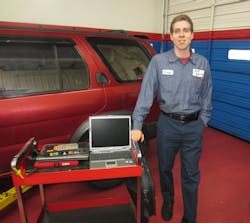When I first owned a repair shop, way back in October 2009, the automotive business was totally different. For one thing, we still fixed cars made in the 1990s, which is something I see almost never in New York now.
Another thing was that the standard oil filters and oil we used were totally different. We still had Chrysler 300Ms that took 10W30 oil, and we almost never saw a cartridge oil filter.
Fast forward to the futuristic year of 2013. Cars don't fly yet, the African Killer Bees seem to have backed down from their initial plans for world domination and the "standard" oil change has become totally different.
A large proportion of the vehicles we work on today use cartridge oil filters. That includes Hyundais, Toyotas, Chryslers, GMs and all the European cars. Torquing oil filter housings, usually between 20 to 30 psi, depending upon the manufacturer, has become the norm.
Plus, motor oil has changed. All the new Toyotas and Hondas take 0W20. GMs require Dexos oil, which outside of a few semi-synthetics can only be found in full synthetic. Chyrslers require MS-6395 full synthetic motor oil.
All European manufacturers will get by with a 5W40 that meets a VW 502 00/505 00, BMW LL04 and MB 229.51 specification. Most mainstream 5W40 manufacturers will come meeting all the European specifications, and outside of VW diesels, can be used universally.
However, regular full synthetics cannot be used on European vehicles unless those specifications are found on the container.
I have found that, remarkably, most customers are fine with the switch. In fact, many will think their run-of-the-mill 2006 Acura requires synthetic, when any 5W20 will do fine.
The question is: Are shops making the switch? Where's your barrel of 0W20? It's not just in hybrids anymore. It's time to get with the program. The oil change as we knew it is going away.
This means our industry is changing. With decreased driving habits and service reminders on vehicles that alert the customer once every 10,000 miles, we are going to have to do a tire rotation on pretty much every vehicle that visits the shop. State inspections might expire as well and need to be done.
The result? A Honda Civic can easily have a $125 for a service without any upselling whatsoever.
Now, only if the tire business would get with the program too...

